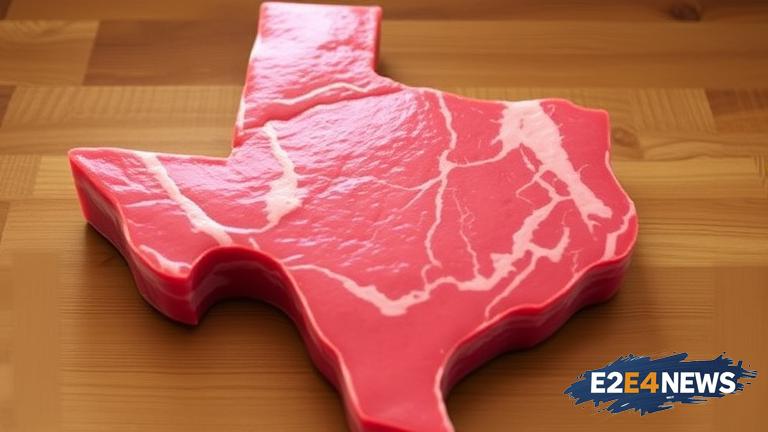In a groundbreaking move, the state of Texas has announced a ban on lab-grown meat, also known as ‘clean meat’ or ‘Franken-meat.’ This decision comes amid growing concerns over the health and environmental impacts of this emerging industry. Lab-grown meat, which is created by culturing animal cells in a laboratory, has been touted as a sustainable and humane alternative to traditional livestock farming. However, many experts have raised concerns over the potential health risks associated with consuming meat that has been grown in a lab. These concerns include the use of antibiotics, hormones, and other chemicals in the production process, as well as the potential for contamination and the lack of long-term studies on the health effects of consuming lab-grown meat. Despite these concerns, many companies have already begun producing lab-grown meat, with some even receiving approval from regulatory agencies. However, Texas has taken a stand against this trend, citing the need to protect traditional livestock farming and the health and well-being of its citizens. The ban, which was signed into law by Governor Greg Abbott, prohibits the production and sale of lab-grown meat in the state. This move is seen as a major victory for the livestock industry, which has been lobbying against lab-grown meat for years. The industry argues that lab-grown meat is a threat to traditional farming practices and could have devastating consequences for rural communities. In addition to the health concerns, there are also environmental concerns associated with lab-grown meat. The production process requires large amounts of energy and resources, and the use of antibiotics and other chemicals could have negative impacts on the environment. Furthermore, the lack of transparency in the production process has raised concerns over the potential for animal cruelty and the use of questionable practices. The ban in Texas is likely to have a significant impact on the lab-grown meat industry, which has been rapidly expanding in recent years. Many companies have already invested heavily in the production of lab-grown meat, and the ban could lead to significant financial losses. However, the move is also seen as a major opportunity for the livestock industry, which could see a boost in demand for traditional meat products. The ban is also likely to spark a national debate over the regulation of lab-grown meat, with other states potentially following Texas’ lead. As the debate continues, it is clear that the issue of lab-grown meat is complex and multifaceted, with valid arguments on both sides. While some argue that lab-grown meat is a necessary step towards a more sustainable and humane food system, others argue that it poses significant risks to human health and the environment. Ultimately, the decision to ban lab-grown meat in Texas is a significant development in the ongoing debate over the future of food production. The move is likely to have far-reaching consequences, not just for the lab-grown meat industry, but for the entire food system. As consumers become increasingly aware of the issues surrounding lab-grown meat, they are likely to demand more transparency and accountability from producers. This could lead to a shift towards more sustainable and humane farming practices, which prioritize animal welfare and environmental sustainability. In conclusion, the ban on lab-grown meat in Texas is a significant development in the ongoing debate over the future of food production. While there are valid arguments on both sides, the move is seen as a major victory for the livestock industry and a significant step towards protecting human health and the environment. As the debate continues, it is clear that the issue of lab-grown meat is complex and multifaceted, and will require careful consideration and regulation in the years to come.
